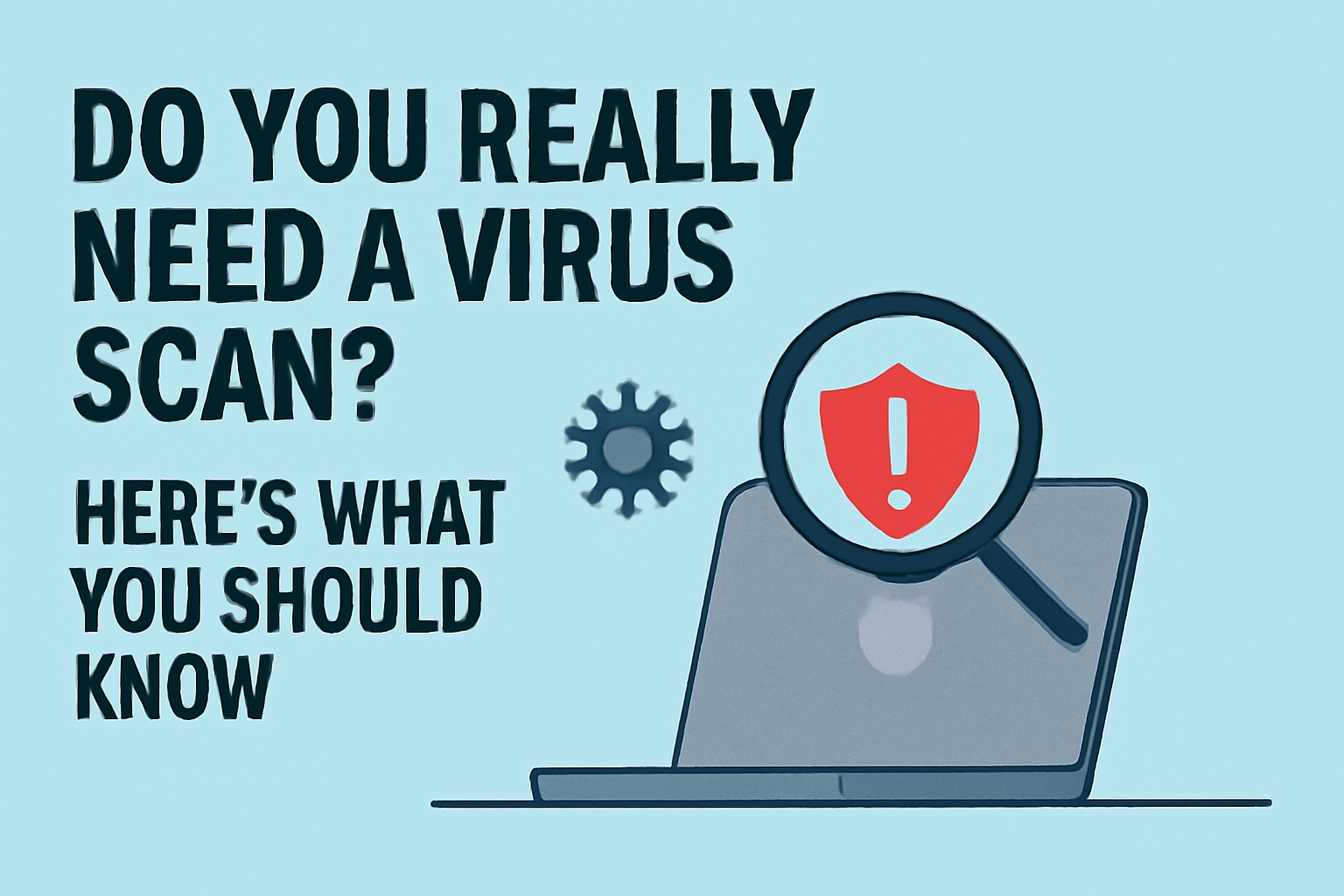Do You Really Need a Virus Scan? Here’s What You Should Know

In today’s digital age, cybersecurity is a major concern for many people. With the increasing number of online threats such as viruses, malware, ransomware, and phishing scams, it’s natural to question whether a virus scan is truly necessary. After all, many modern devices come equipped with some form of built-in security, and some individuals might feel that they’re safe enough without additional protection. But is that really the case?
In this blog, we’ll dive into the importance of virus scans, how they work, why you might still need them, and how they fit into your overall digital security strategy. By the end, you’ll have a clearer understanding of whether a virus scan is worth the investment and how it can help protect you in an increasingly interconnected world.
Understanding Virus Scans: What Are They?
Before we can discuss whether you truly need a virus scan, let’s first understand what it is. A virus scan is a security process used to detect malicious software (malware) that may be present on your computer, smartphone, or other digital devices. It works by checking files, applications, and websites for known patterns of harmful code. If any threats are found, the virus scanner will either quarantine or remove them, preventing the malicious software from causing damage.
In essence, a virus scan acts as a safety net, providing an additional layer of protection against potentially harmful content that could slip past other forms of security, such as firewalls and built-in security software.
The Evolution of Cyber Threats
To fully appreciate the importance of virus scans, it’s helpful to look at how cyber threats have evolved over the years. In the early days of personal computing, viruses were often simple programs that would disrupt system operations or cause files to become corrupted. These early viruses were relatively easy to detect, as they tended to have clear signatures or patterns that could be identified by antivirus software.
However, as technology advanced, so did the sophistication of cyberattacks. Hackers now create viruses and malware with stealthier characteristics, making them harder to detect. Some types of malware, like rootkits and trojans, are designed to stay hidden from both users and traditional virus scanners. Additionally, new threats such as ransomware have emerged, which demand that victims pay a ransom to regain access to their own files.
Given the constantly changing landscape of cyber threats, having a virus scan that can keep up with the latest dangers is more critical than ever.
Why You Might Still Need a Virus Scan
Even with improved built-in security features on modern devices, there are several compelling reasons why you might still need a virus scan. Here are some of the most important points to consider:
1. Cybersecurity Threats Are Ever-Evolving
As mentioned earlier, cyber threats evolve rapidly. New viruses, malware, and phishing schemes are constantly being developed, and older virus scanners may not have the necessary updates to detect these latest threats. A dedicated virus scan service can provide frequent updates to ensure it can catch even the newest dangers. Without one, you could find yourself vulnerable to attacks that exploit unknown weaknesses in your system.
2. Comprehensive Protection Across Devices
While some operating systems have built-in security features, they often don’t cover every type of threat. For example, built-in security may not be enough to protect against certain types of adware or advanced malware. A dedicated virus scanner, on the other hand, offers more robust protection across a wider range of threats, providing peace of mind that your system is covered from all angles.
Additionally, modern antivirus programs can scan multiple devices simultaneously. If you own several devices, like a laptop, smartphone, and tablet, it can be a hassle to ensure that each one is properly protected. A good virus scan can provide cross-platform security to keep all your devices safe.
3. Real-Time Protection and Threat Monitoring
Many virus scanners offer real-time protection, meaning they actively monitor your system for any suspicious activity. This is particularly important if you spend a lot of time browsing the web or downloading files. With real-time protection, a virus scan can catch threats as they appear, blocking malware or viruses from infecting your system before they have a chance to do any damage.
Real-time monitoring also helps protect you against phishing attacks and malicious websites, both of which are growing in prominence. With a virus scan, you gain an additional layer of defense to catch these types of threats in real-time.
4. Protection Against Phishing and Malicious Websites
Phishing attacks are one of the most common ways that cybercriminals attempt to steal personal information. These scams often appear as legitimate emails or website pop-ups that trick users into revealing sensitive data, such as usernames, passwords, and financial details. While traditional firewalls and browsers may have some basic phishing protections, a virus scan can offer an extra line of defense.
By analyzing the links you click and the websites you visit, a virus scan can alert you to dangerous sites or warn you about phishing attempts, allowing you to stay safer while online.
5. Enhanced Privacy and Data Protection
With more personal and sensitive data being stored digitally than ever before, protecting your privacy is a top priority. Viruses and malware can steal or compromise your information, putting your data at risk. Whether it’s personal documents, bank details, or even photos, the potential for loss is significant if your devices are not adequately protected.
A virus scan can help safeguard your data by detecting and removing any malware that may be trying to access your information. Additionally, some virus scans offer features that can help you securely erase files, ensuring that sensitive information is completely wiped from your device.
When Can You Rely on Built-In Security Features?
While dedicated virus scans offer great protection, it’s important to note that many modern operating systems (e.g., Windows, macOS, Android, iOS) come with built-in security features that can help protect against some types of threats. For example, Windows Defender offers real-time protection against viruses and malware, while macOS has its own security measures to prevent malware from infiltrating the system.
However, built-in security tools are not foolproof. They may not catch newer threats or more sophisticated malware, and they often lack the depth of protection that dedicated virus scanning tools offer. It’s also important to note that many of these security tools are reactive rather than proactive. They can detect threats after they have already infected your system, whereas a virus scan can help prevent infections from happening in the first place.
How to Choose the Right Virus Scan for Your Needs
If you’ve decided that a virus scan is necessary, the next step is choosing the right one for your needs. Here are some tips to help you make the right decision:
- Look for Frequent Updates: A good virus scan should offer regular updates to keep up with new and evolving threats.
- Consider Real-Time Protection: Real-time scanning is essential for detecting threats as they occur.
- Cross-Platform Support: If you use multiple devices, choose a virus scan that provides protection for all your gadgets.
- Ease of Use: Choose a virus scan with a user-friendly interface that doesn’t require advanced technical knowledge to operate.
By carefully considering these factors, you can ensure that your devices remain safe and secure from potential threats.
Conclusion
In conclusion, while built-in security features can help protect you from some threats, they are often not enough to offer comprehensive protection against the ever-growing variety of cyberattacks. A virus scan adds an additional layer of security, helping to keep your devices safe from the latest viruses, malware, ransomware, and phishing scams.
With the constant evolution of cyber threats, it’s clear that a virus scan remains an essential tool in maintaining your digital safety. Take the necessary steps to safeguard your devices, and don’t underestimate the value of proactive protection.
For more information on protecting your digital devices, you can always check out https://phishs.com/.
